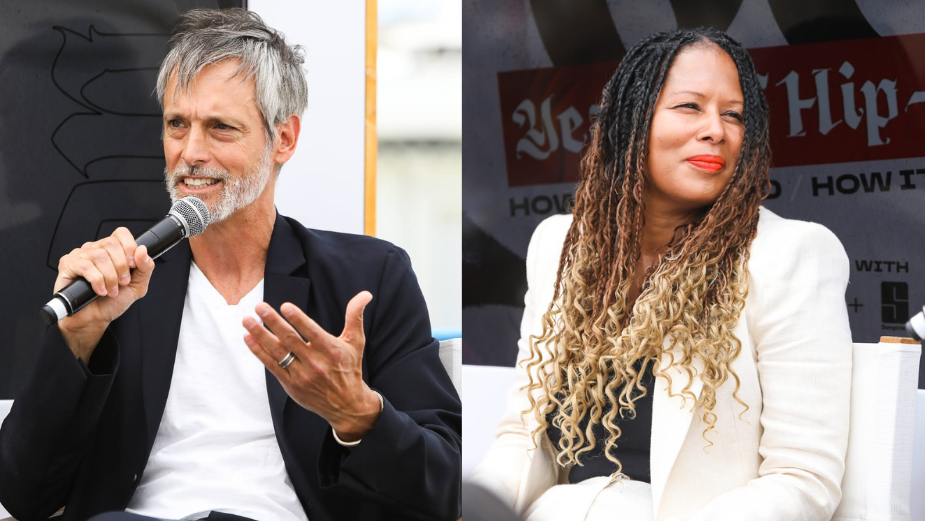
Dave Rolfe and Cheryl Ryan on Hip Hop at 50

Partnering with iconic Hip Hop magazine The Source, Hogarth has created a video series titled ‘50 Years of Hip Hop: How It Started / How It’s Going’. The show brings generations of Hip Hop artists together and explores the impact the genre and its innovators have had on the music industry, their peers and wider society.
Seeking a brand partner for the series at the Cannes Lions Festival of Creativity, on the day after Juneteenth, WPP and Hogarth’s global head of production, Dave Rolfe, and Hogarth's global head of DE&I, Cheryl Ryan, assembled a panel - in partnership with music company Songtradr - to talk about Hip Hop's 50 years of influence, the importance of media ownership and protecting Black culture.
With the sun beating down on The GroupM Rooftop at advertising's biggest yearly event, the discussion quickly heated up and proved that Hip Hop is about more than just spitting fire. The panellists joining Dave and Cheryl included Londell McMillan, an entertainment lawyer known for representing Prince and some of Hip Hop’s biggest names; Kevin Liles, CEO of record label 300 Entertainment and former president of Def Jam; and Lady London, an up-and-coming artist with over 1,000,000 followers on Instagram, travelling a steep, self-made trajectory.
Speaking to LBB after the event, Dave and Cheryl discussed the key learnings from the panel, what Hip Hop means to them and the importance of media ownership for Black creators especially.

Above: (Left to right) Londell McMillan, Lady London, Kevin Liles, Cheryl Ryan and Dave Rolfe.
"We've known the impact of Hip Hop, but now - because it's become so transcendent - we look at it in terms of influence,” said Dave when introducing the panel. “It has transcended what this genre or, as Kevin calls it, what this movement represents now.”
This was a key talking point of the panel, with Londell going on to explain that “anything from Black culture that Hip Hop represented became global culture”. After decades of “making billions for others,” Kevin added that it’s time for Black artists to start treating the music business as just that - a business - and earn for themselves, all while protecting the culture through ownership and authentic representation.
“Hip Hop is a form of media in many ways, but very few owners of the medium and the culture existed,” agreed fellow panellist Londell. “So, the messaging is often put out without any thought.” This is something that Lady London also said she had taken into consideration when partnering with brands, saying that being in control as an artist goes beyond the art - “It’s about owning your brand.”
Reflecting on the panel afterwards with LBB’s Ben Conway, Dave says that the first “ah-ha moment” was the willingness that the panellists displayed towards collaborating and communicating candidly with the marketing community. “We sought raw conversation, and our panellists, who equalled the gravity of what we were talking about, spoke in ways reflective on the journey of Hip Hop throughout global creative culture, but also challengingly, toward the marketing, media and entertainment industries, about authenticity and empowerment toward artists, creators and progressive ownership.”
Looking back, Cheryl also reflected on Hip Hop’s influence as a creative platform for the Black community’s “unfiltered, ungoverned” stories and perspectives. Growing up in the UK, she said that she faced racism at school and didn’t see Black culture embraced in the mainstream until Hip Hop artists like Queen Latifah, Dre Dre, Salt-N-Pepa, Snoop Dogg and more made Black people and culture become “popular and trendy,” seemingly overnight.

“It was a way for youth self-expression to address historical generational socio-economic issues, turning this into an opportunity for marginalised communities to rise up,” she said. “Hip Hop clubs and freestyle battles offered creative ownership and a safe space for the Black community to vocalise its opinions. It came from a place of truth. Black artists were owning, managing and making a business out of their music. They became brands – it was a big ‘wow’ moment!”
On a personal level, this movement helped Cheryl to love and respect her culture – the injustices, resilience and strength that inspire the “creative genius”. Furthermore, seeing women that could hold their own (and then some) in the rap scene, empowered her and demonstrated the potential of creative expression through music. This power to uplift a global community and bring real social change is something that feeds back into her daily responsibilities as head of DE&I at Hogarth.
“After 20+ years in the ad agency space, not seeing anyone who looked like me, and acknowledging that despite the odds I had made it, I want to pay it forward and do my part to elevate and open up the creative space for diverse talent.”
Discussing other ways in which the genre influences the marketing world, Dave said that Hip Hop’s “authentic” voice helps it transcend culture and even the best forms of advertising. “It extended from ‘community’ before we started using the term. And it isn’t about ‘rawness’ that we assume comes from the genre - this itself is eloquently challenged by Kevin Liles in his activism; ‘music has always contained rawness of subject matter, so why do we highlight this so much in Hip Hop?’. It is about authenticity of voice and experience. We yearn for this in creative arts - period.”
As well as highlighting this year’s Film Craft Grand Prix winner at Cannes, ‘We Cry Together’, a short musical film created by rapper Kendrick Lamar and actress Tailor Page, Dave noted how omnipresent the genre has become in media. “It’s simply everywhere: from Pharrell off the heels of his Paris show for LV, to Cardi B giving what I thought was the best six-second performance in a Super Bowl ad a few years ago with Amazon, to Drake mesmerising me before he was Drake in Sprite’s ‘Spark’ ad, to every other ad I try to produce, it's ubiquitous.”
So how can marketers ensure that they’re being authentic when using Hip Hop in advertising? Cheryl said that the key is investing in authentic relationships with Black creatives, and working intentionally with an eye to long-term opportunities. Specifically, she warned that marketers should research how to connect with their audiences and ensure they are aligned on, and not shying away from, complex issues and societal changes that the Black artists and community are facing and discussing. Failure to do so, she added, can have an adverse impact on brands, but when it works well, “it can serve to connect brands to new generations, audiences and experiences - increasing relevancy, growth and profitability.”
She continues, “Kevin and Londell have opened the doors and invited marketers to spend time in the music industry, to better understand the parallels and opportunities for the music business, media and entertainment to work in collaboration with brands and the ad industry. Creating true synergy between the two worlds has the potential to unleash an influential superpower which can bring about real change in the world.”

Speaking during the panel, record executive Kevin Liles said, “We come from a place where we were supposed to sing and dance, not own,” - a disparity that the Black community has been struggling against since the very beginning of the music industry. Addressing how agencies can attract more diverse talent and improve Black ownership of media, Cheryl listed Hogarth’s programmes like ‘The Originals’ and ‘WPP Creative Technologists’ as tools to find talent from a range of backgrounds, without the need for CVs or specific qualifications. She also highlighted DE&I champions on the production side of things as key drivers - like her co-moderator of the panel, Dave Rolfe.
“Behind and in front of the camera, brands and audiences are demanding more diverse storytellers, creators and makers to create authentic narratives,” she said, praising brands who seek out people with lived experience and expertise. “People hold brands to account and want to share the same values and experiences - you can’t fake it.”
To bring the ‘50 Years of Hip-Hop: How It Started, How It’s Going” series to life in an authentic way, Hogarth partnered with Londell’s Hip Hop magazine, The Source, which Dave said brought “vast expertise” and “unparalleled credibility” to the project. “Londell was looking for a team that could move quickly and be committed to understanding the genre and community. And the partnership flourished! For us to extend this series into the media and brand partner world, saying that this was built by The Source, gave instant respect to what we’re trying to build with the series.”
Describing it as “an incredible opportunity for a marketing partner, sponsor and activation enabler”, he added that the series, founded and directed by Jake McAfee, is the first he’s seen built by both an expert and fan. Additionally, he explained the importance of investing in projects like this outside of the traditional advertising sphere, saying that it’s “critical to get into the ‘direct-in-culture’ space”, especially in an “inviting” genre like music.
“It’s remarkable to have seen what music has gone through over the past 25 years,” he continued, “and brand partnerships have been a key function of its resilience and transcendence. Look no further than Coke Studios’ initiative, bringing authentic partnership plus brand-as-publisher purpose as expression and reward from the trademark brand.”
One of the other focuses of the series is the concept of marrying ‘OG and new school’, a principle that extends to the marketing world - termed by Dave as “precedent versus pioneer.” Explaining how it's a natural component of the evolution of any industry or art form, he said he combines his veteran notions with brand-new perspective and guidance. “This is a foundational function of creativity - which perhaps is ‘juxtaposition’... always bringing clash and flourish.”

Not only did the WPP/Hogarth team hope to emphasise the journey from old school to new school in the world of Hip Hop through the series and panel, but also the wider ongoing journey being experienced to this day by the Black community. “We were proud to be hosting the panel a day after Juneteenth,” said Dave, “and it’s important to highlight that date, not just as a moment of ascendance from oppression but probably much more signifying the journey (and sacrifice) in getting there. And the journey is still coursing now.”
Part of this journey today involves Black creatives being able to take ownership of the media that has shaped culture on a global scale since Hip Hop’s inception. “We have the power to shift the culture because we are the culture,” said Lady London, speaking at the panel. Agreeing, Londell added that there is an opportunity for Black creators to create and own new platforms and experiences themselves which will go on to “engage and inspire the next generation”.
From Dave and Cheryl’s perspective on the agency side, and as facilitators of brand partnerships through projects like the ‘50 Years of Hip Hop’ series, the path is clear: engage talent from the culture itself who align with a brand’s authentic messaging. This way, the next 50 years of Hip Hop will see more representative usage in marketing, via projects owned and created by (and for) the Black community.
“What is very important is that we need to put more vigour into this area,” said Cheryl during the panel. “We need to measure progress and be able to have collaborations with companies like Songtradr who are deeply committed to inclusivity in music. But also what’s important is how we can bring that to brands and how we can bring more diversity and data into brands’ workflows - as well as how the audience experiences that.”
As someone who represents artists from the record label side, Kevin added, “We have to hold the companies that we work with accountable to not just check the box. We need to have more people inside, especially in the C-suite, who come from the same place as what you’re selling and the audience you’re trying to reach. We’ve got to take ownership of the brands we partner with and who we are. We need more people who think like us in the positions to make the decisions, and to take the risk.”















